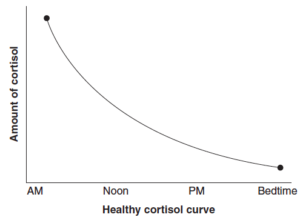

Adrenal distress, a frequently missed cause of fatigue, anxiety and frequent infections, is easily identified with a few simple tests. Dr. Doni explains what’s involved.
If you read my last two posts, The Three Problem Networks of Stress and What is Adrenal Burnout?, you will be starting to get familiar with the three main areas that create problems when we are under constant stress—adrenal distress, leaky gut, and carbohydrate metabolism. Today’s post continues from last week’s and dives into the details of how to test for adrenal distress. Next time, we will look more closely at possible treatments for adrenal distress.
First of all let’s recap the health issues that would tell you to consider testing for adrenal distress (also known as adrenal fatigue, adrenal exhaustion or adrenal burnout). Adrenal distress can cause you to feel tired, anxious, and/or lightheaded. Not only that, but it can also be the underlying cause of the following health conditions:
- allergies
- autoimmunity
- frequent infections (anywhere in the body)
- digestive issues such as gastro-esophageal reflux (GERD), gastritis, and irritable bowel syndrome (IBS)
- sleep issues
- brain fog and decreased memory
- depression and/or mood changes
- PMS and infertility
- joint and muscle pain
- skin rashes (eczema, psoriasis, acne, and more)
Because adrenal distress affects the four core systems—digestion, immune system, nervous system and hormones—leading to a vicious cycle of inflammation and stress in the body, I consider it to be one of the three problem networks.
Considering that adrenal distress has the potential to cause issues that could greatly impact your daily life, to be able to determine whether you have adrenal distress is quite important for your overall health. Not only that, but once we know whether adrenal distress is contributing to your ill-health, we can address it.
How we test for adrenal distress
When you are under stress, the adrenal glands produce cortisol and adrenaline that prepare your body to respond. The best way to test for adrenal distress is to measure the levels of these “stress responders.” Let’s look at each of them in turn.
Note: Most practitioners are not aware of adrenal distress and won’t offer to test these levels.
Cortisol
Cortisol, also known as the stress hormone, increases as part of our body’s response to stress. Even when we are not stressed, cortisol is an important hormone that should be at a higher level in the morning, gradually decreasing throughout the day to its lowest level at night while you sleep. When we are chronically stressed, cortisol production can be thrown off track, becoming either too high or too low at various times of day.
 To identify adrenal distress, we need to look at the cortisol level not just in the morning, but throughout the day, to see how they have been affected. We can do this by measuring cortisol in the saliva at four different times of day – upon waking, midday, evening, and bedtime. Then we can create a curve showing how your cortisol level changes throughout the day and compare that to optimal levels.
To identify adrenal distress, we need to look at the cortisol level not just in the morning, but throughout the day, to see how they have been affected. We can do this by measuring cortisol in the saliva at four different times of day – upon waking, midday, evening, and bedtime. Then we can create a curve showing how your cortisol level changes throughout the day and compare that to optimal levels.
Test it: Four timed saliva or urine samples—upon waking, midday, evening and bedtime.
Adrenaline (also known as norepinephrine and epinephrine)
Adrenaline is a stimulatory hormone and neurotransmitter. When we are stressed, our adrenaline levels soar, leading to the signs that are characteristic of stress and the ‘fight or flight response’ including heart racing, sweating, breathing faster, and tense muscles.
With continued stress over time, the amount of norepinephrine and epinephrine produced can increase or reduce, depending on how your adrenal glands hold up under stress. We can measure the levels in urine.
Test it: Second morning urine sample, before eating.
How to tell whether adrenal distress has affected your four core systems
As I discussed in a previous blog, stress can have a major effect on each of the four core systems of the body: digestion, immune system, hormones and the nervous system and, in doing so, creates 3 problem networks: leaky gut, carbohydrate metabolism and adrenal distress. Let’s look now specifically at how adrenal distress affects the 4 core systems.
Hormones
Stress and cortisol affect hormone production and activity throughout the body—often decreasing both production and function. It can be helpful to test certain hormone levels in order to determine the impact of adrenal distress and to identify areas in your body that need support.
DHEA (dehydroepiandrosterone), for example, is a hormone that is also produced by the adrenal glands. It influences our energy levels and vitality and is converted to estrogen and testosterone , so is an important source of these hormones for women (especially post-menopausally) and men. DHEA levels may either increase or decrease as a result of exposure to stress. Low levels are associated with decreased memory, energy, fertility, and libido. Elevated levels are associated with facial hair growth and acne. Testing the level is the only way to know whether DHEA is influencing your health issues. Addressing adrenal distress will help bring DHEA levels back to optimal..
Test it: Saliva or blood test.
Neurotransmitters
The messengers in the nervous system that affect mood, sleep, energy levels, focus, and food cravings are called neurotransmitters. Examples are serotonin, GABA, dopamine, and glutamate. Neurotransmitters are made in the body from amino acids (nutrients that come from protein in food), and they either have a stimulatory or calming effect on the body. Neurotransmitters are both affected by stress, and have an influence on how your body responds to stress. If your stimulatory neurotransmitters are elevated, for example, you are more likely to feel anxious when stressed.
It is extremely helpful, therefore, to measure neurotransmitter levels in the urine to help us understand how your nervous system has been affected by adrenal distress. Once we know which, if any, of your neurotransmitter levels are too high or too low, we can use specific nutrients and herbs to optimize and stabilize your nervous system.
Test it: Second morning urine sample, before eating.
Immune System and Digestion
These two core systems are also affected by stress, making immune and digestive issues more likely. One example is leaky gut, which is caused by stress and involves both the digestion and immune system. I’ll be covering leaky gut in much more detail in the coming weeks.
What you can do about it
I’ll be getting into possible treatments in my next piece, but here are some steps you can take right now:
- Set a time to meet with me so that we can review your case and arrange for a cortisol and adrenaline panel to check your adrenal function. We’ll also want to look at your DHEA and neurotransmitter levels to help guide us. Click here to see the appointment options.
- If you feel that you need to learn more first, read my book, The Stress Remedy, which will guide you step-by-step through understanding how stress may be affecting your health, and about the science behind this approach.
- If you’ve had some of these tests done already and have tried various treatments, but you’re still not feeling your best, then we need to sit down, review your exposure to stress, how it is showing itself in your body, and consider what may be continually disrupting your cortisol and adrenaline levels. Click here to see the appointment options.
Often patients have a sense that their symptoms are all connected, and yet standard tests are not intended to show us those interconnections. I want to help you learn more about what is at the root of your health issues.
If you have any questions—about this, or any health issues—please ask in the comments section below. Or of course, you can always contact me directly!
–Dr. Doni
1st August 2014
Share this Post:
Dr. Doni Wilson's Team
14 Day Detox Program
Take the Stress Type Quiz
Dr. Doni Social Media
Popular Posts


The 5 Burnout Types

Healing HPV Holistically: Dr. Doni on the Inspire Health by Jen Podcast

Recent Podcasts
Signup to receive our weekly newsletter with all the latest news, podcasts and special offers
New Book - Order Today!

SIMPLE PRACTICES for SHIFTING FROM YOUR STATE of STRESS to YOUR FLOW and FREEDOM
MASTER YOUR STRESS
RESET YOUR HEALTH
Order Now! Related Posts

What is making you susceptible to HPV?
I have been working with women who had abnormal cells on their cervix and/or vaginally, caused by HPV for over 20 years now. And while

The 5 Burnout Types
Did you know there are 5 burnout types? They are based on your Stress Type®, which is how your adrenal function has been affected by

Healing HPV Holistically: Dr. Doni on the Inspire Health by Jen Podcast
Dr. Doni was interviewed by Jen Ciszewski on the Inspire Health by Jen Podcast, talking about how to heal away HPV from your body for good.

Stress and Trauma: The Science Behind It, How It Shows Up and How to Heal: Dr. Doni on The Burn Fat and FEAST Podcast
Dr. Doni was interviewed by Sarah B. Thomas on the Burn Fat and FEAST Podcast, talking about the impact of stress and trauma on our health and what to do to recover from them.















4 Comments
I have been suffering for quite some time (years) with low thyroid, I am taking 60 mgs of Armour Thyroid and 20 mgs of Synthroid. I have continued to feel out of sorts, with absolutely no energy, hot, awful nausea, constipation, brain fog – at times I feel I’m going crazy. I do have gastroperesis, three stomach ulcers, and acid reflux. I have been on the thyroid meds for quite sometime and do not feel any better. My gynecologist said something about my adrenals, so I did the saliva test, she said my adrenals have bottomed out, adrenal distress. She put me on hydrocortisone for three weeks, no change. I just did a three day stool sample, and am waiting for my results. I didn’t see anything in your articles about a stool sample for detecting adrenal distress. This has pretty much become my life: exhausted, sadness, and large amount of weight gain. I can not think straight, when I try I break into a sweat and forget what I was even doing, no energy at all, I sit, that is it, I don’t even shower, to wash my hair wears me out, everyday things are impossible.
Hello Joni,
I’m sorry to hear how you’ve been feeling, and I’m glad that your doctor is helping you look for solutions. You have a complicated case… which will require working on several levels at once. Addressing your digestion – that’s where the stool test will help – is very important. It sounds to me that a neurotransmitter panel would also help, as would checking organic acids (urine test) – you could ask your doctor about those tests. For your adrenals (the stool test won’t tell you about your adrenals)…it could help to check urinary adrenaline levels, and then to use nutrients/herbs to support your adrenal function. You may want to get a copy of my book – it will help you to know how all these puzzle pieces fit together and help you to improve step by step. Keep in mind that I’m not able to “treat” via the web… so if you’d like me to review your case, please do schedule a consultation time.
This makes so much sense to me. My body is a mess. I’ve been taking levothyrixine for three years for hypo thyroid. At the time I started these, endo and full function doc treated cortisol, urine, saliva and blood. Had to do it twice as request from hospital lab because cortisol numbers were high off their chart. Same on second round but nothing done being. Then a few months ago things went crazy. I’ve now been battling chronic ITP on top hypo. My platelets go down so bad and not responding well. I’m on 100mg prednisone just trying to keep them above 20,000 (should be at least 140,000). And now besides all this prednisone daily I’m on rituxan treatments, just had second of four treatments. Hoping for good response but all the meds make me feel horrible. The more I read about cortisol the more I’m wondering if this is my original culprit. I’m starting to change the way I eat and also since taking this crazy dose of prednisone I’ve lost weight. Which hematologist thinks is cool and I don’t hate it. But, the endo who was treating the hypo said I would never lose weight with cortisol levels like I have, offering no help at all to fix or treat. So I’m wondering if the prednisone has somehow stopped or slowed the cortisol over the past month and that’s why I’ve lost some? It’s a crazy puzzle. Can’t work cuz of effects of meds are horrible. Feel like a roller coaster ride and I just want to get off. I’m eating better than ever and really believe that had a lot to do with things. So much here, appreciate your thoughts. Thank you.
Hi Kathy,
I do think it would benefit you to work with a naturopathic doctor or functional medicine doctor who can help you sort through these overlapping issues. It sounds to me from reading your brief description that there may be an autoimmune component, and it would be important to address the underlying issue in order to help you come off prednisone, which would then allow your cortisol levels to decrease. Please know that there are practitioners who could help you with this, and help you to feel better. Check out Naturopathic.org for information on NDs near you or consider meeting with me virtually.
Dr. Doni